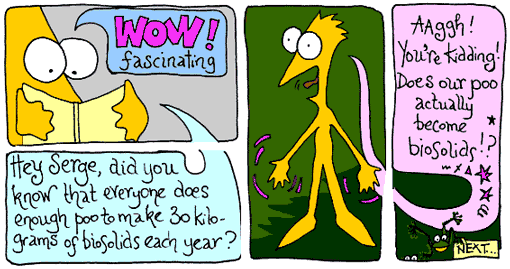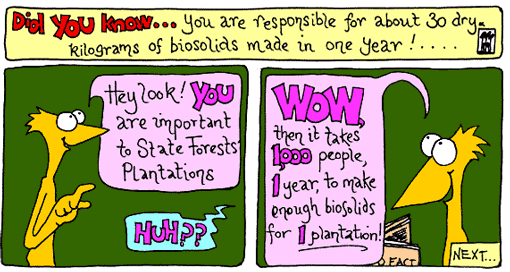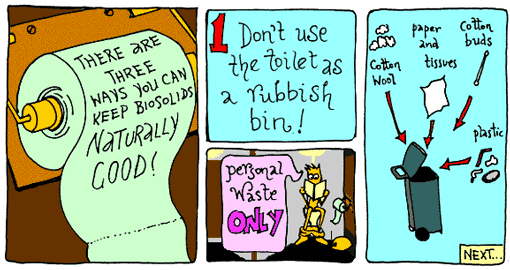 Wastewater treatment is an important mechanism that operates mainly to protect the public health from contamination. Wastewater contains a mixture of liquid and solid harmful pollutants which are eliminated in the process of filtration. Biosolids, or digested sewage solids are the by-product of municipal wastewater treatment that can be beneficially and safely recycled. But how can sewage solids possibly be beneficial?
Wastewater treatment is an important mechanism that operates mainly to protect the public health from contamination. Wastewater contains a mixture of liquid and solid harmful pollutants which are eliminated in the process of filtration. Biosolids, or digested sewage solids are the by-product of municipal wastewater treatment that can be beneficially and safely recycled. But how can sewage solids possibly be beneficial?  Biosolids are a nutrient-rich organic material and are considered for use as fertilizers to improve and maintain productive soils and as a plant growth stimulator. The land application of biosolids are preferred over the use of conventional fertilizers, which reduces the demand for chemical fertilizers. There are numerous advantages of the responsible and safe biosolids recycling. The use of biosolids can improve crop production, reduce soil erosion and protect water quality, provide topsoil for recreational uses. promote plant growth in abandoned mined lands, conserve landfill space, and also provide economic incentives. The management concept of recycling biosolids has been around for thousands of years in an effort to maintain soil. It has been used for decades, with no demonstrated adverse affects to human health. By recycling biosolids, it provides an environmentally sound alternative to disposal of wastes so we can help conserve landfill space and save communities money.
Biosolids are a nutrient-rich organic material and are considered for use as fertilizers to improve and maintain productive soils and as a plant growth stimulator. The land application of biosolids are preferred over the use of conventional fertilizers, which reduces the demand for chemical fertilizers. There are numerous advantages of the responsible and safe biosolids recycling. The use of biosolids can improve crop production, reduce soil erosion and protect water quality, provide topsoil for recreational uses. promote plant growth in abandoned mined lands, conserve landfill space, and also provide economic incentives. The management concept of recycling biosolids has been around for thousands of years in an effort to maintain soil. It has been used for decades, with no demonstrated adverse affects to human health. By recycling biosolids, it provides an environmentally sound alternative to disposal of wastes so we can help conserve landfill space and save communities money. Biosolids can be easily mistaken as an unsanitary practice that can be harmful to the health of humans. The most common concerns related to biosolids have to do with toxic pollutants, odor, nutrients, and pathogens. Biosolids may contain small traces of metals that are known to be potentially harmful to humans. Organic compounds (e.g. pesticides) found in biosolids are present in concentrations near the lowest detectable limits. Improperly managed application of biosolids can cause odor problems, especially in residential areas.
Overall, the agricultural use of biosolids can be beneficial to humans as we as the environment. Proper management of biosolids will show now significant risk to the environment and human health. The benefits of biosolids far exceeds the disadvantages as it offers an environmentally sound alternative to the disposal of wastes, while health risks are negligible if it complies to the regulatory requirements.
References:
"Biosolids Benefits."biosolids.com. N.p., n.d. Web. 10 May 2011. <http://www.biosolids.com/benefits.html>.
"Biosolids Program."Department of Environmental Protection. N.p., n.d. Web. 10 May 2011. <http://www.portal.state.pa.us/portal/server.pt/community/biosolids/10588>.
"Common Concerns."biosolids.com. N.p., n.d. Web. 10 May 2011. <http://www.biosolids.com/concerns.html>.
"FAQ - Biosolids."CCWA/ACEPU. N.p., n.d. Web. 10 May 2011. <http://www.cwwa.ca/faqbiosolids_e.asp>.
"Frequently Asked Questions."biosolids.com. N.p., n.d. Web. 10 May 2011. <http://www.biosolids.com/faq.html#08>.
Commented Blog Posts:


